- Home
- Our Solutions
Titus Services
Unlock Moodle's Potential with Titus
Migrate to Titus and transform how you use Moodle in your organisation. - Industries
- Our Work
- About
- Blog


Whether you’re looking into learning management systems for the first time or planning to migrate or upgrade from a legacy LMS, reviewing the available options can become a significant time sink.
On the surface, there’s a great degree of similarity between offerings from the major brands, but while the headline features may make it seem like there’s little to choose between them, there may be important differences that affect how well suited they are to your specific organisation.
Of course, as a Moodle Partner, Titus is firmly in the “you should adopt Moodle Workplace” camp – let’s not pretend otherwise. However, we’ve been in the business a good while now, and we’ve spoken with hundreds of businesses going through the initial selection and procurement process.
In this article, we aim to share some of the key steps involved, guide you through how to choose an LMS, the questions you should be asking at each stage to fully evaluate and understand the suitability of a given platform for your unique needs and narrow down your shortlist.
The best choice for you might not always be Moodle – although we’d strongly suggest taking a look – over a quarter of a billion (registered) users can’t be wrong!
01 Requirements Capture: What do you want from your LMS?
Perhaps the most fundamental question at the beginning of this process is “What do I want this LMS to do?”. Of course, the obvious answer – to improve your learning and development provision – is an important one. But going beyond this, it’s crucial to flesh out your specific goals in more detail to be able to select the right product.
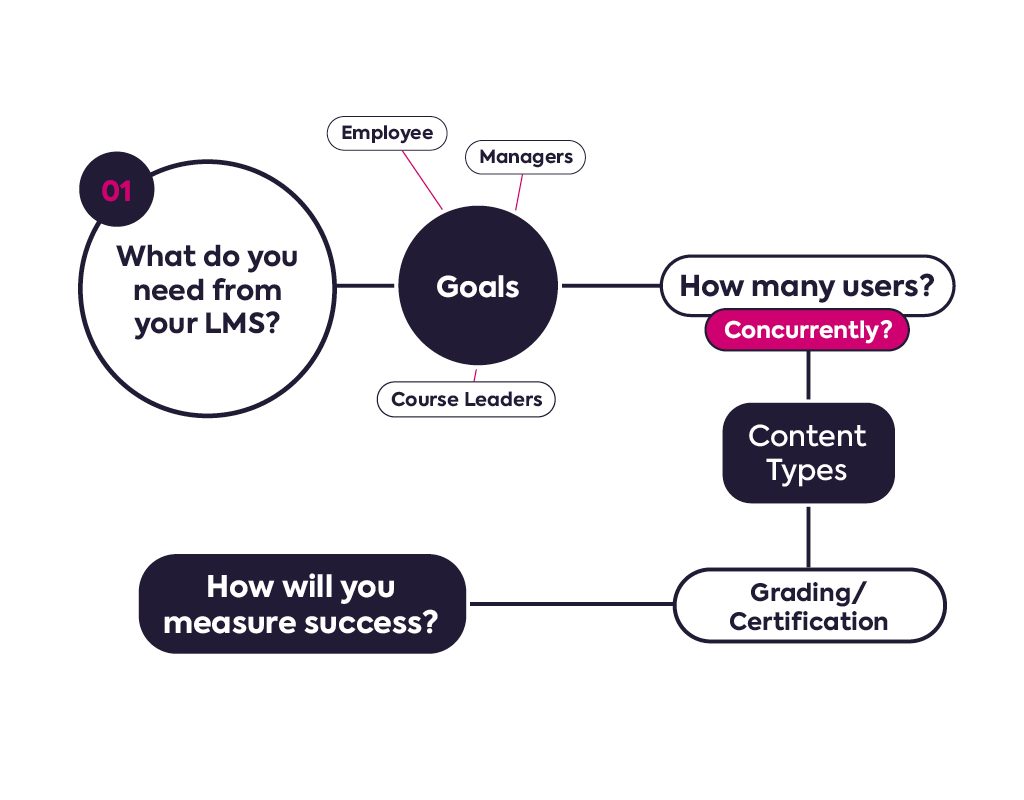
Consider for example the specific types of learning you want to offer, the individual abilities and profiles of your employees, when and where the learning will be delivered, and how you will measure the success of the platform, and the achievements of your learners.
There are also practical considerations, some of which we’ll discuss in more detail later, related to the number of learners the platform needs to support, the security considerations involved, the extent to which you are able to manage and support the platform, the time available for implementation – the list goes on.
A good starting point is to develop user stories for key profiles – learner, course leader, manager, administrator – based on the specific tasks they will be completing via the platform.
02 Set your budget: How much does an LMS cost?
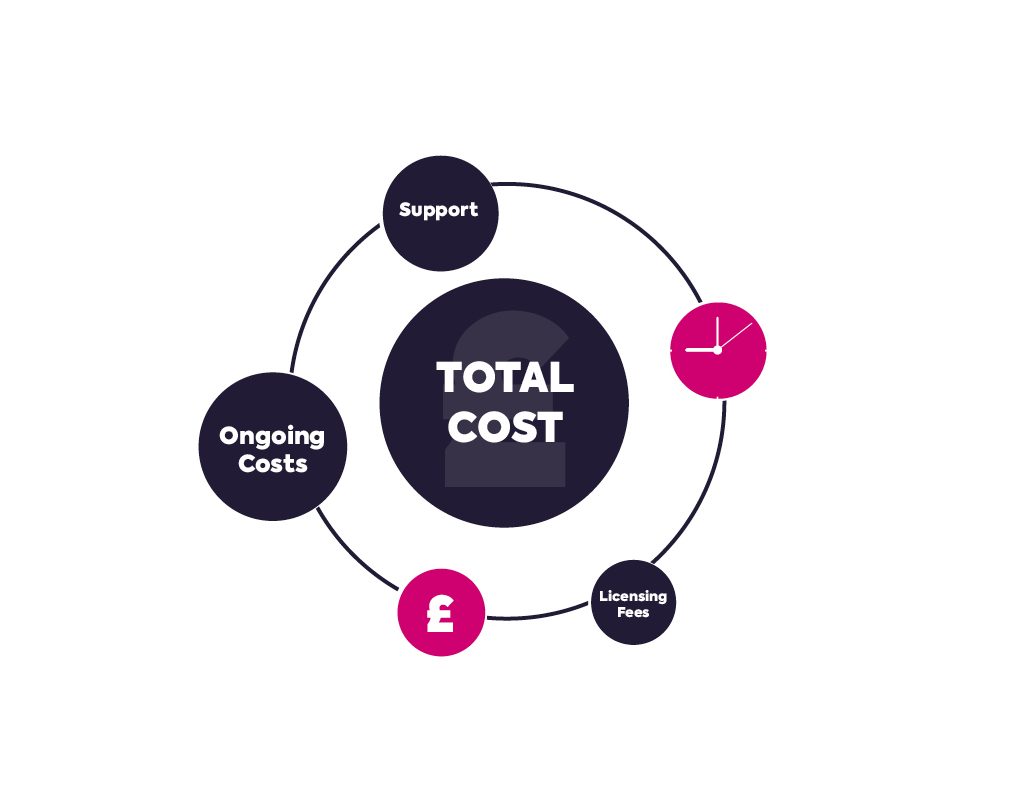
This seems like an obvious point to make, but it’s important to be thorough when budgeting for a new LMS, especially if you don’t have an existing system in place. The most immediate cost will be the initial setup and delivery, but this may not be the greatest expense in the longer term.
Annual or monthly support, service and licensing fees can add up to a substantial sum over the lifetime of the platform, and added extras such as custom designs and software integrations can push up the initial outlay.
On top of this, you should consider the investment you’ll need to make in managing the project from your side, as well as the time needed for training, liaison and monitoring.
03 Consider user experience (UX)
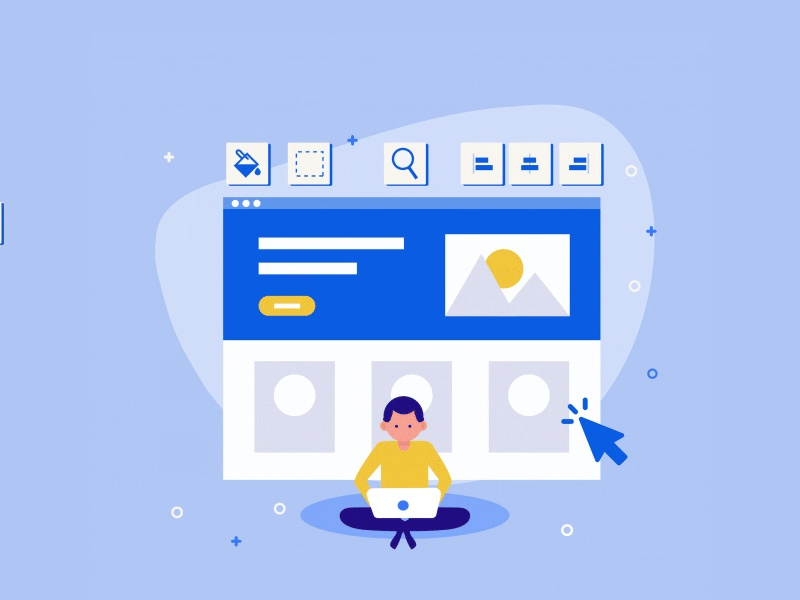
An LMS can succeed or fail based solely on the user experience. Creating a platform that learners find hard to navigate, frustrating to use or missing key elements turns learning into a necessary evil – a chore that needs to be completed to the minimum acceptable standard.
Well designed learning platforms incorporate UXD best practice to create an environment in which users are motivated to pursue their learning goals, and feel supported throughout the process. Accessibility is also a crucial factor in ensuring that your learning provision is available to all employees, including users of assistive technologies.
Practically speaking, focusing on the usability of the platform not only leads to wider engagement from learners but can also reduce costs, lowering training overheads and allowing for faster onboarding, for both learners and management.
From a design point of view, it’s important to many organisations that the LMS can be branded in accordance with their corporate identity, and that the design is adaptive/responsive, allowing the platform to be accessed from multiple types and sizes of device without compromising the quality of the experience or the features available.
04 Assess the feature set
Most LMS provider websites have a similar list of key features, and many of them will be basically identical. It’s important to review which of these are essential, which are desirable, and which are unnecessary in terms of your own learning and development strategy in order to begin to differentiate between the available option.
Beyond the “out-of-the-box” functionality though, some platforms allow you to extend the functionality of the platform by adding plugins, in some cases offered by the provider, in some cases by third party companies or users themselves. It’s equally important to review these, to assess whether the combination of features you require is achievable via the use of such add-ons.
Some providers may also offer custom feature development “from scratch” – which can be particularly valuable if you require specialist functionality which is not immediately available, although you should enquire about the likely costs of creating new features and balance it against the feasibility of utilising existing functionality to achieve the same aim.
05 Review the need for integration with existing systems
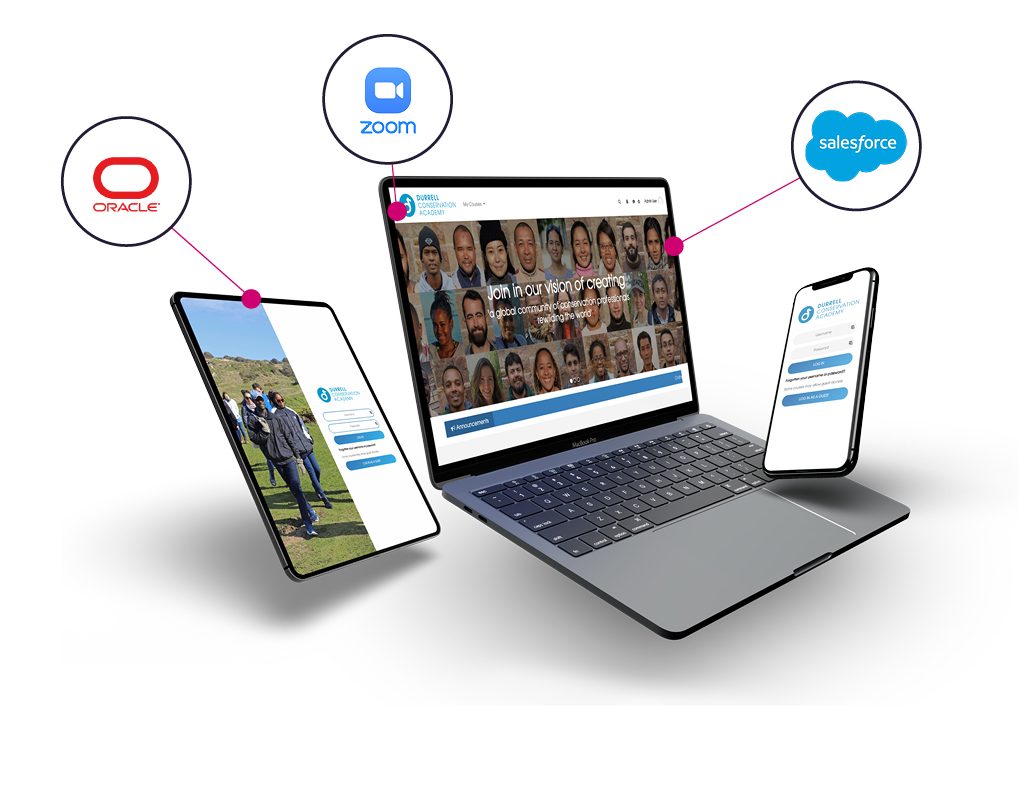
An important consideration for any software purchase is how well it will work with your existing systems. When choosing an LMS, this is of particular significance, as learning and development impacts and interacts with multiple areas of your business.
Integrating your LMS with other key assets such as MIS, HR software, CRM or office suites can result in added functionality and lower administrative overheads, allowing you to automate tasks such as onboarding users, updating employee profiles, managing compliance or certifications and sharing content and resources.
For some organisations, deploying a new LMS may be the ideal time to look at upgrading other areas of IT provision within the business in tandem, such as moving to cloud storage or adopting web-based products such as Google Workspace or Office 365. In this case, choosing an LMS which will support this change is essential.
06 Evaluate security, stability, and scalability
From a technical perspective, there are a number of factors that will affect how well your new LMS fits your requirements. Most obviously, whether it has the capacity to support the number of current and potential users, without a drop in loading speed or performance.
You may also want to assess how the system copes with unplanned demand, and whether this affects costs. Choosing between cloud-based hosting or dedicated infrastructure, either at a managed data centre or on your premises may depend on your specific performance requirements. In a worst-case scenario, you’ll need to know that your data is backed up and recoverable – how long this takes will vary between providers.
Security is also a key consideration for most organisations, and you should look at the measures in place, both on a software and hardware level to prevent unauthorised intrusion or interception of data. In terms of processing sensitive or personal information, ask about the platform’s ability to support your responsibilities under data protection legislation such as GDPR.
07 Understand the options for reporting and analysis of your LMS data
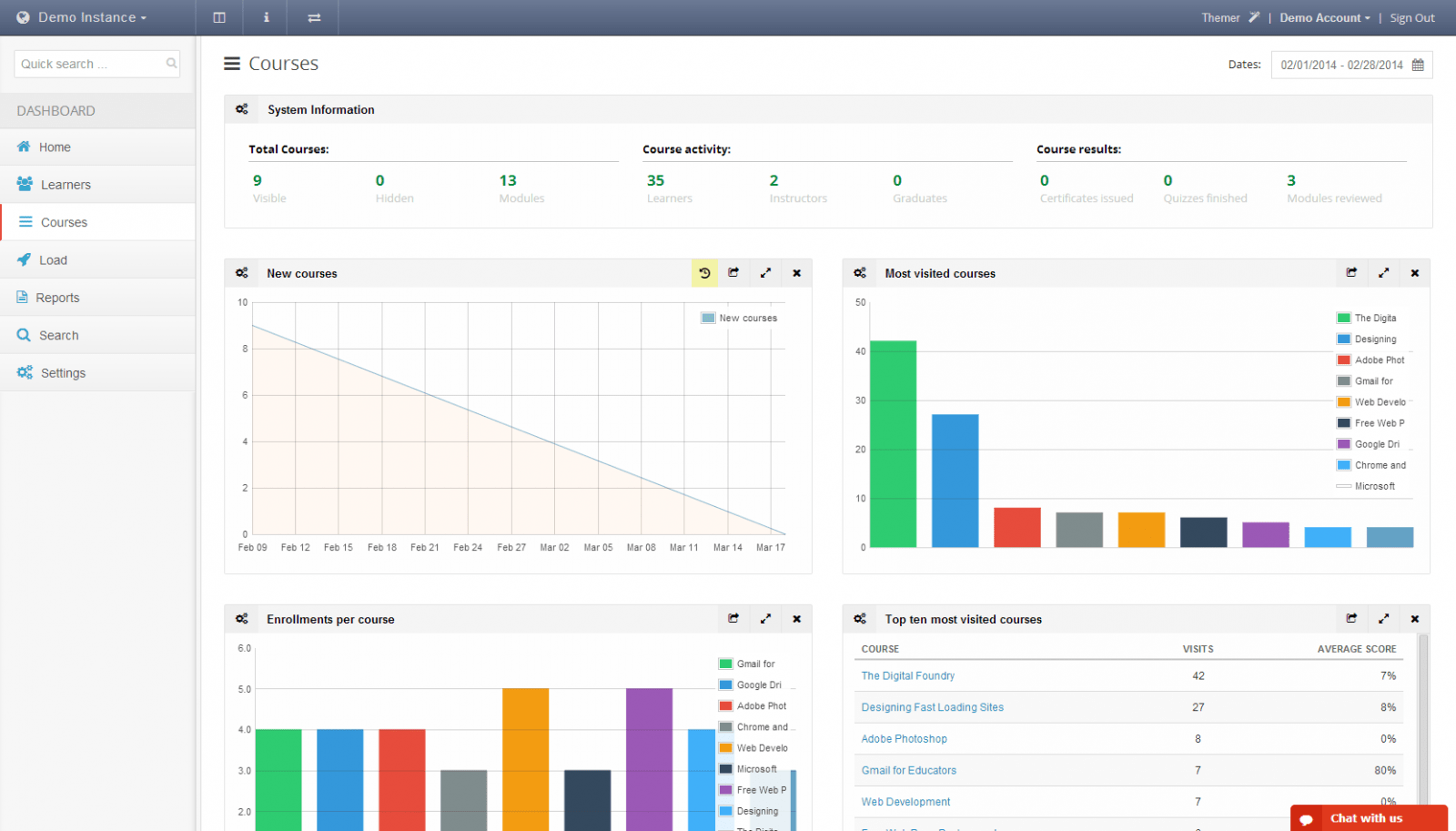
One of the most transformative aspects of e-learning is the ability to gather quantitative data including how your learners are interacting with the material, their success rate in assessments, or usage trends and patterns. To unlock the value of this data, you need an LMS which provides high quality and easy to interpret reports.
The format of reporting can vary significantly between platforms, from a simple CSV or spreadsheet dump containing rows of data that require further manipulation to understand, to sophisticated visual dashboards displaying key insights in real-time.
In our opinion, you shouldn’t have to be a data scientist to be able to draw conclusions from the output of your LMS. The more accessible the reports are, the easier it is for managers and administrative staff to make informed decisions on how the platform is used, and how it could be improved. Ideally, key data should also be available to learners, allowing them to track their own progress and empowering them to take ownership of their learning and development.
08 Find out what support provision is available
LMS support varies considerably between providers. Some companies consider their support responsibility to end at simply supplying you with a call centre number or website to log tickets when something goes wrong. Also, the extent of the support they can offer may be limited if they don’t have access to the code behind the LMS itself, as in the case of a reseller.
Others will offer a fully managed and proactive service where your supplier will endeavour to preempt any potential issues by active monitoring and management of the platform.
The most involved providers will meet with you periodically to discuss how the platform is being used and advise on changes you can make to improve its efficiency or extend its functionality, especially as new features and upgrades become available.
09 Ask for references or testimonials
At Titus, we always endeavour to give honest advice on the suitability of our products and services for prospective clients, but of course, we understand that sometimes there’s no substitute for hearing about the experience of someone who’s been in your position themselves.
We’d strongly recommend that when speaking to an LMS provider, you ask them to provide references or testimonials from previous clients, to give you an insight into the process and quality of service from a customer viewpoint.
Whatever stage you’re at in researching and procuring a new LMS, the team at Titus is available to help. Contact us for a no-strings-attached discussion on the options and functionality available via Moodle Workplace or Moodle LMS. We’ll be happy to cover the questions mentioned above, as well as referring you to clients in your sector for whom we’ve delivered best-in-class learning platforms.

Privacy Policy | Cookie Policy | Data Protection Policy | Equality, Diversity and Inclusion Policy
© 2023 Titus Learning LTD | Company Number 08799881 | VAT Number 1813 09027
Super talented, unflappable and very funny, Phuong supports the whole marketing team in her role as Digital Marketing Executive. Phuong holds a bachelor’s degree in Business Administration and recently completed a master’s degree in Management and Marketing. Originally from Hanoi in Vietnam, Phuong is now based in the UK and climatising brilliantly to our weather and food.
Phuong owns a food review Instagram page as travelling and food are her passion. She also has a cute little french bulldog.
Ellie was the first woman to join Titus and has paved the way for many more since then. After studying for a degree in Fashion and Marketing, Ellie was lucky to find herself at fashion weeks and photoshoots.
Now she’s switched from talk of the front row to front end design and has brought loads of transferable knowledge to Titus. Ellie has also found a real passion for tech, especially in the learning sector, helping clients create positive change for their organisations.
As one of the youngest people at Titus but at the same time one of the oldest serving members of the team, Callum has graced Titus with his broad smile and positive attitude for over 5 years now. As a key member of the marketing team, Callum works across all areas, both on and offline, to ensure that all Titus brands and communication are on point.
After missing out on the opportunity to go to University the first time around, management encouraged him to enrol in our course alongside his work. He is now studying to achieve his Level 6 Diploma in Professional Digital Marketing.
Always bringing innovation and new ideas, Dec studied a degree in Journalism but found his passion in digital marketing. Dec has also worked in marketing for one of the countries biggest retailers and within the property sector.
Outside work, Dec Co-founded a news publication where he collaborated with global brands like Uber, Amazon, BooHoo and countless SMEs.